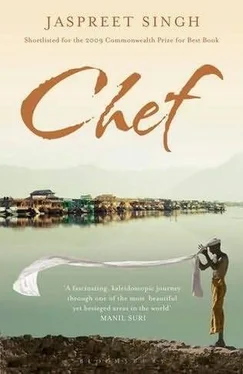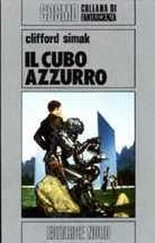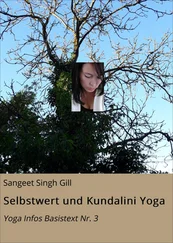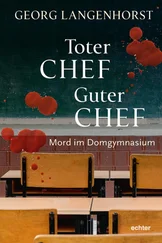‘Ready-made tea, sir?’
‘Sorry?’ I asked.
His fingers were grubby. He was the new Chef’s assistant.
‘Ready-made chai, sir?’
‘No milk and sugar in my tea.’
‘Sir.’
‘Wait,’ I said.
‘Sir.’
‘What is that white slab in the lawn?’
‘The dog, sir.’
‘When did it happen?’
‘Don’t know, sir.’
He left tea and Marie biscuits on the table in front of my chair. The tea was horrible, no cardamom and excess ginger.
Sipping tea I asked myself if my need to cling to life was so enormous that I had forgotten my morals. I thought of all the people who will attend the wedding banquet dressed in peace silk and paisley, and they will talk as if all was well and all will be well. They will eat tandoori chicken and mint chutney and mango pudding and drink Bailey’s chai. And the things they will say about Rubiya’s choice of a husband. They would have said things anyway, they always do, but this time they will say more as if they were entitled, and the few who will fly in from Pakistan will display their suave French-cuff shirts, and they will wine and dine and dance and repeat the same worn-out phrases – ‘Give us your Bombay actress Madhuri’ and ‘Take our Kashmir!’ and no one will pay any attention to people like Irem. People like her do not matter. Damaged people like her do not matter at all. Even when they leave the hospitals they remain sick. Even when they leave prisons they remain trapped. Their sickness is being alive. Their crime is that they continue to exist.
The wedding guests will say, The curry did not have right enough masala. While others after a few bottles will say, Curry karari thee, bahout khoob sahib, bahut khoob. Gazab ka korma. Subhan Allah, the Hindus will say. Some will speak English with English accents and some will display polished American accents and say, The curry was not done yet, or some other infantile thing, like the curry was fun-tastic, very good hanh. Someone else in broken English will say, Ever since my wife die-vorced me I have not had this kind of curry, and then someone will correct the man, It is ‘divorce’ not ‘die-vorce’. Yes, yes, that is what I meant, the other would say. Why am I here? What am I doing here? I asked myself in the walnut chair.
Soon the ADC led me to the General’s room. The corridor was unusually cold. He walked fast, and I walked slow, but finally both of us stood in front of the door. The curtains were swaying.
It must have been a slight hesitation on my side that made the ADC literally push me inside. General Sahib was standing in front of the window, hands crossed behind his back, one hand trembling.
On the little circular table not far from his bed a cigarette – half-consumed and hurriedly extinguished – released a few threads of smoke.
Not knowing what to do, I clicked my heels. The General turned and said, ‘Jai Hind’ and walked towards me and shook hands and then he almost hugged me, but something made him change his mind. His hand started trembling violently.
‘Kirpal, how is your mother?’
‘Not well, sir.’
He sat at the edge of his bed and pointed towards the armchair.
‘Please sit down.’
This was the first time I had received such an honor, and perhaps that is why I hesitated again.
‘Sit down,’ he said, ‘Sorry there is smoke in the room. I have just seen the doctor. After the doctor leaves I always have to smoke.’
‘No problem, sir.’
‘We knew.’
‘Sir.’
‘You would come. You would not fail us.’
‘Sir.’
‘Rubiya will be pleased,’ he said. ‘You came because of her?’
I sensed that the General wanted to have a long conversation, but his breath was coming out with a wheeze.
‘Take your bath. Drink water. Rest. Don’t forget you are in the mountains now. We will have dinner together.’
He rang the bell.
The servant appeared.
‘Keep the bags in the Guest House.’
‘Sir,’ I said, ‘if you don’t mind I am staying in a hotel.’
‘Your room is ready.’
‘Please, sir. If you do not mind.’
‘In that case, Kirpal, my car will take you there.’
‘Thank you, sir.’
‘We must have a quick word.’
‘Sir.’
‘Rum?’ asked the General.
‘No, thank you, sir.’
On the way to the Raj Bhavan I had thought of the possibility of facing him alone, and I knew he was waiting for it and I tried to predict his questions. I, too, had questions. So much time had passed and the questions had acquired a huge weight. Looking at the frail form of General Sahib now I felt like delaying them. Things had to sort out between us, but not right away. Looking at the plane trees outside the window, bare tops swaying in the wind, I felt like experiencing one last bright moment of Kashmir, it was enough for that day of my arrival. ‘After you left did your cooking change?’ he asked.
‘Very right, sir. I have discovered that simplicity is the main principle of cooking. My dishes are growing simpler and simpler.’
‘So I will begin with a simple question,’ he said. ‘Why did you leave, Kirpal?’
He looked through me and I was unable to say a word.
‘For all official purposes it was the health of your mother, Kirpal. The court martial cleared your name. The army sent an official apology and compensation afterwards. The circumstantial evidence said that you were guilty. But that enemy woman said you were not guilty.’
‘Her name is Irem, sir.’
‘Yes, yes – I know. She had not even filed charges against you. So why did you leave?’
I was not able to say a word.
‘I think I know why you left,’ he said. ‘All these years I have tried to answer this question, but I want to ask you if there is an iota of truth in this. You were like my son, Kirpal, and your father was well-liked. He was my finest officer. I know why you left. I know it. You fell in love with her. You were in love with that woman. That is why you left.’
He looked at me again in the eye.
‘You loved her the way Rubiya loves this man from Pakistan. I had told Rubiya no matter what happens the boy will not step inside this house. What right does Rubiya have to act on her desires the way she did? Tell me. When you were completely in love with that enemy woman, when you could control your desires, then why not Rubiya?’
Because I was at a loss for words the General continued.
‘Sometimes I think the desire for the enemy is more than the desire for our own. No one knows this better than you. And that is why you left. That was the real reason. You did not want to act on your desire. You did not want to. You saw a villain or two. And that was the easy way out. You saw the villain and left. And you did not even have the courage to tell me the truth. But how could you have told me? I was the one more powerful. I was like your father, Kirpal. But you used your ailing mother to deal with something you could not deal with. Your mother’s sickness became the veil to hide behind. And because you did not talk about the problem you thought the problem did not exist. Now say something.’
‘Sir.’
His breathing grew heavier.
‘I wanted Rubiya to be here. In a way it is good she is not here. God knows where she is. After all I have done to you, will you still be kind enough to be the chef at her wedding? Civil wedding. It is going to be a small affair. Twenty, thirty people. The boy’s family is coming by bus from the Pakistani-occupied Kashmir.’
‘Of course, sir.’
‘Everything must be perfect. This is Rubiya’s wedding. Everything must be ek-dum perfect.’
‘Sir, you have my word. But.’
‘I knew there was a BUT.’
‘No, sir. I would just like to have a word with Ms Rubiya. Regarding the menu, sir.’
Читать дальше
Конец ознакомительного отрывка
Купить книгу












